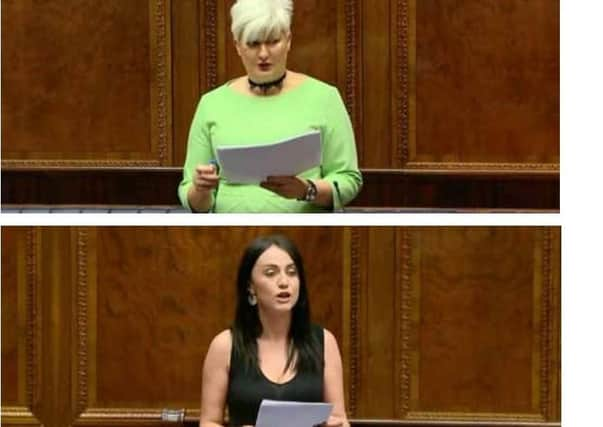DUP and Sinn Féin agree to oppose abortions for Down’s Syndrome – but still disagree in vote


In an unusual debate tonight where Stormont discussed abortion for the first time since devolution was restored and widespread abortion was legalised in Northern Ireland, both parties said that they believed the law passed last year by Westminster went too far.
The DUP last year opposed the change, while Sinn Fein said at the time that it supported what Westminster was doing.
Advertisement
Hide AdAdvertisement
Hide AdHowever, amid accusations from some MLAs and pro-choice activists that Sinn Fein was playing politics with the issue, the party yesterday argued both in favour of what Westminster had done, while also opposing it.
The debate centred on a DUP motion which said the Assembly “rejects the imposition of abortion legislation which extends to all non-fatal disabilities, including Down’s syndrome”.
Sinn Fein tabled an amendment to that motion which said the Assembly “rejects the specific legislative provision in the abortion legislation which goes beyond fatal foetal abnormalities to include non-fatal disabilities, including Down’s syndrome”.
As expected, that amendment fell and Sinn Fein then voted against the DUP motion.
Advertisement
Hide AdAdvertisement
Hide AdThat allowed Sinn Féin to both say that it had tried to limit abortion and had opposed the DUP’s attempts to limit abortion.
Neither the DUP motion, which passed by 46 votes to 40, nor the Sinn Fein amendment would actually have changed the law, but are a signal of the Assembly’s will ahead of what is likely to be a legislative attempt by the DUP to limit abortion.
In proposing the motion, DUP MLA Joanne Bunting said that last year’s change to the law had seen Northern Ireland “subject to constitutional indignities” which Wales or Scotland would not accept. She praised the “truly inspirational” work of disability campaigner Heidi Crowter, who was named in the motion, a 24-year-old with Down’s Syndrome who works in a children’s hair salon and is to marry her fiancé next month.
Describing her as “an extraordinary human being”, she said it was wrong that babies with her condition could now lawfully be aborted in Northern Ireland because last year’s legislation allows abortion up to birth in circumstances where the child “would suffer from such physical or mental impairment as to be seriously disabled”.
Advertisement
Hide AdAdvertisement
Hide AdShe said that abortion in England for conditions such as cleft palate, cleft lip and club foot are deemed to meet the threshold of “seriously disabled” – even though each of them can be addressed through surgery.
She said that meant saying that “viable human beings with non-fatal disabilities and conditions like Down’s Syndrome are worthy of less protection under the law than viable human beings who are deemed to be able-bodied.
“This in turn says that people with Down’s Syndrome or other disabilities are of less value than people without disabilities. This is completely unacceptable in 2020.”
However, Sinn Fein’s Emma Sheerin claimed that the DUP was trying to undermine all abortion provision. The Mid Ulster MLA said that Sinn Féin “supports abortion in instances of fatal foetal abnormalities, for victims of sexual crime, and for anyone whose life or health – including their mental health – is in danger”.
Advertisement
Hide AdAdvertisement
Hide AdAddressing those who are pro-choice, she said: “To simply dismiss people who are uncomfortable with the legalisation of termination as backwards or regressive is not helpful”.
She said that Sinn Fein had supported the new abortion law and “welcomed decriminalisation, something that punished people in already difficult circumstances”.
However, she added: “Sinn Fein do not believe that a non-fatal foetal abnormality is an appropriate criteria for an abortion”. Fellow Sinn Féin MLA Colm Gildernew said: “Sinn Féin does not support CEDAW’s recommendations to provide abortion in the case of sever foetal impairment such as Down’s Syndrome.”
There was disagreement evident within Alliance and the SDLP, parties which allow a free vote on abortion.
Advertisement
Hide AdAdvertisement
Hide AdThe SDLP’s Dolores Kelly criticised Sinn Fein for supporting a Westminster-imposed law “determining the right to life of unborn Irish children – it’s a long way from the proclamation of 1916 which promised to cherish all the children of the nation equally”.
But party colleague Matthew O’Toole said the new law was a “positive step forward” and “it really isn’t for me to say to women in extreme distress that they can’t access healthcare”.
Alliance MLA Chris Lyttle, who more than three years ago supported legislation to allow for abortion in cases of fatal foetal abnormality, said that he could not support abortion for non-fatal disability. He said: “The DUP and Sinn Féin appear to agree on this matter and somehow have transpired to disagree in this debate today.”
Party colleague Paula Bradshaw said those suggesting a woman would make a choice to terminate a late pregnancy without careful thought “are viewing these women with disrespect and a lack of empathy” and accused the DUP and Sinn Fein of “playing politics”.
Advertisement
Hide AdAdvertisement
Hide AdGreen Party leader Clare Bailey, whose party stood aside in favour of Sinn Féin as recently as December, said: “I am stunned at this amendment from Sinn Fein; I’m stunned at their fork-tongued language...this is what political opportunism looks like and this is what populism looks like”.
Independent MLA Claire Sugden accused the DUP of not using the power which it had at Westminster to stop the legislation coming into force, something Arlene Foster rejected.
UUP MLA Rosemary Barton said she had “a sense of bewilderment and irony” at discussing abortion while medics are battling to save lives, and added: ”All humans should be valued and protected equally”
Comment Guidelines
National World encourages reader discussion on our stories. User feedback, insights and back-and-forth exchanges add a rich layer of context to reporting. Please review our Community Guidelines before commenting.